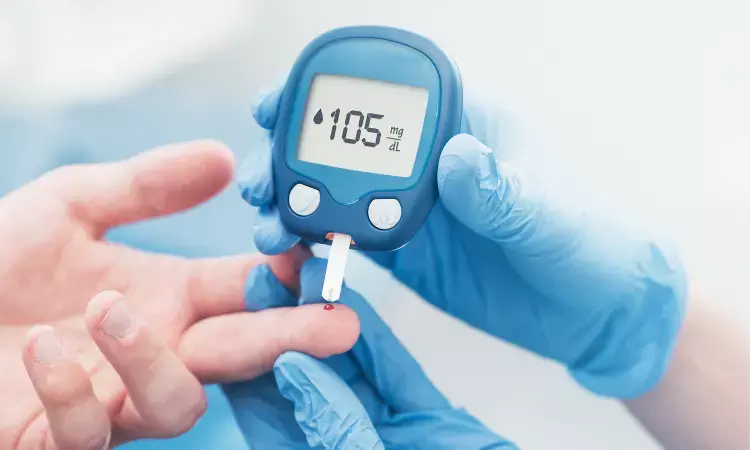- Home
- Medical news & Guidelines
- Anesthesiology
- Cardiology and CTVS
- Critical Care
- Dentistry
- Dermatology
- Diabetes and Endocrinology
- ENT
- Gastroenterology
- Medicine
- Nephrology
- Neurology
- Obstretics-Gynaecology
- Oncology
- Ophthalmology
- Orthopaedics
- Pediatrics-Neonatology
- Psychiatry
- Pulmonology
- Radiology
- Surgery
- Urology
- Laboratory Medicine
- Diet
- Nursing
- Paramedical
- Physiotherapy
- Health news
- Fact Check
- Bone Health Fact Check
- Brain Health Fact Check
- Cancer Related Fact Check
- Child Care Fact Check
- Dental and oral health fact check
- Diabetes and metabolic health fact check
- Diet and Nutrition Fact Check
- Eye and ENT Care Fact Check
- Fitness fact check
- Gut health fact check
- Heart health fact check
- Kidney health fact check
- Medical education fact check
- Men's health fact check
- Respiratory fact check
- Skin and hair care fact check
- Vaccine and Immunization fact check
- Women's health fact check
- AYUSH
- State News
- Andaman and Nicobar Islands
- Andhra Pradesh
- Arunachal Pradesh
- Assam
- Bihar
- Chandigarh
- Chattisgarh
- Dadra and Nagar Haveli
- Daman and Diu
- Delhi
- Goa
- Gujarat
- Haryana
- Himachal Pradesh
- Jammu & Kashmir
- Jharkhand
- Karnataka
- Kerala
- Ladakh
- Lakshadweep
- Madhya Pradesh
- Maharashtra
- Manipur
- Meghalaya
- Mizoram
- Nagaland
- Odisha
- Puducherry
- Punjab
- Rajasthan
- Sikkim
- Tamil Nadu
- Telangana
- Tripura
- Uttar Pradesh
- Uttrakhand
- West Bengal
- Medical Education
- Industry
Tailoring screening by race and ethnicity may catch diabetes cases earlier, improve health equity

Diabetes is a leading cause of morbidity and mortality, affecting more than 34 million adults in the United States. Current United States Prevention Services Task Force (USPSTF) guidelines recommend that 35-70 year-old adults with overweight and obese weight (i.e., a BMI of 25 kg/m2 or greater) be screened for diabetes. However, Americans in racial/ethnic minority populations have a higher prevalence of diabetes even at normal weights, are less likely to be aware of their diagnosis, and are more likely to die of diabetes than White Americans.
The USPSTF also released recommendations in 2021 that acknowledge that some racial and ethnic minority populations are at higher risk, which may warrant screening at lower ages or BMIs.
Researchers from Beth Israel Deaconess Medical Center and Harvard Medical School used data from the National Health and Nutrition Examination Survey to determine the BMI threshold for diabetes screening in major racial/ethnic minority populations with benefits and harms equivalent to those of the current diabetes screening threshold in White adults.
The authors found that among 35-70 year-old Americans with normal weights, individuals from racial/ethnic minorities were at substantially higher risk of diabetes compared with White individuals: 13% of Asian Americans, 10% of Black Americans, 12.2% of Mexican Americans, and 7.0% of other Hispanic Americans had diabetes compared with 3.5% of White Americans.
According to the authors, to identify the same proportion of patients with diabetes as White Americans, clinicians would need to screen 35-70 year-old Asian Americans starting at a BMI of 20 kg/m2 and Black and Hispanic Americans starting at a BMI of 18.5 kg/m2. Moreover, among individuals with a BMI of 25 kg/m2 or greater, it would be equitable to initiate diabetes screening in individuals from racial/ethnic minorities starting at younger ages: Asian Americans at 23 years, Black Americans at 21 years, and Hispanic Americans at 25 years.
Thus, expanding diabetes screening to lower BMIs or younger ages in racial/ethnic minority populations may improve equity in diabetes care in the US. The authors recommend that future studies should examine the long-term health effects and cost-effectiveness of implementing screening thresholds specific to race/ethnicity to reduce disparities in diabetes diagnosis.
An editorial by Quyen Ngo-Metzger, MD, MPH, calls on the USPSTF to update its diabetes screening and preventative services recommendations to reflect the differential risk for diabetes among different racial/ethnic groups.
Dr Kamal Kant Kohli-MBBS, DTCD- a chest specialist with more than 30 years of practice and a flair for writing clinical articles, Dr Kamal Kant Kohli joined Medical Dialogues as a Chief Editor of Medical News. Besides writing articles, as an editor, he proofreads and verifies all the medical content published on Medical Dialogues including those coming from journals, studies,medical conferences,guidelines etc. Email: drkohli@medicaldialogues.in. Contact no. 011-43720751


